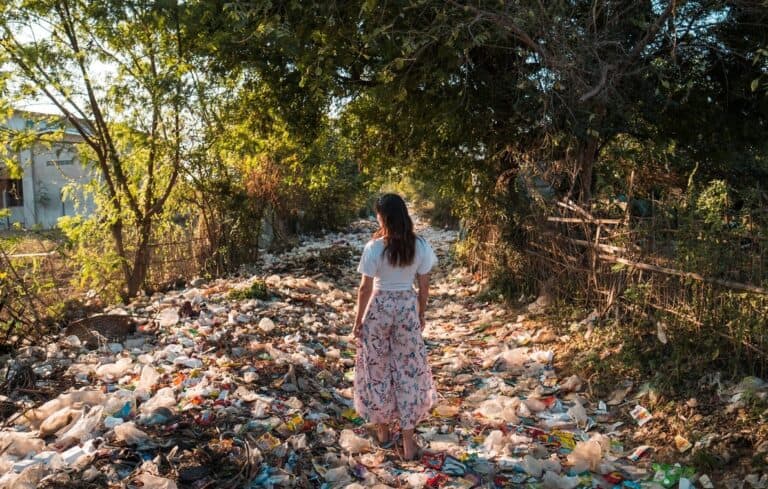Introduction
Where does the rubbish go? This question drives waste management in the UK, a system that directly affects the environment, public health, and economy. Every day, households and businesses generate vast amounts of waste. While recycling and energy conversion handle some of it, a significant portion still ends up in landfills, incinerators, or the natural environment. To develop sustainable habits and reduce environmental harm, we must understand where rubbish goes and how waste management processes work.
The Current State of Waste Management in the UK
Over the years, the UK has improved its waste management system by:
- Implementing recycling programs that repurpose materials and reduce landfill waste.
- Developing waste-to-energy initiatives that transform waste into usable power.
- Enforcing stricter regulations to limit pollution and encourage sustainability.
Despite these efforts, several challenges persist:
- Contaminated recycling streams reduce efficiency and lead to waste rejection.
- Landfill dependency continues to contribute to greenhouse gas emissions.
- Waste exports result in improper disposal in some countries.
Why This Matters
Addressing these challenges requires collaboration between:
- Government bodies, which enforce policies and regulations.
- Industries, which create and adopt innovative waste management solutions.
- Individuals, who influence waste reduction through responsible recycling and sustainable choices.
What This Article Covers
This article explores:
- Where rubbish goes, tracing its journey from household bins to recycling or disposal.
- Sustainable waste processing, including landfill management and eco-friendly alternatives.
- Challenges in recycling, along with ongoing waste reduction initiatives.
- Emerging trends, highlighting new solutions shaping the future of waste management.
By understanding where the rubbish goes, we can make informed choices and contribute to a cleaner, more sustainable future.
What Happens to Household Rubbish in the UK?
When we throw rubbish away, we rarely think about where it ends up. Where does the rubbish go after collection? In the UK, waste follows a structured process that includes collection, sorting, recycling, and disposal.
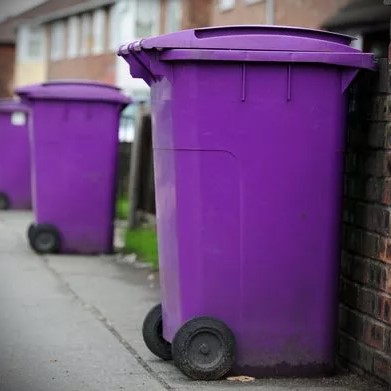
1. Collection and Sorting
Local councils or private waste management companies collect household rubbish through a dual-stream system, separating general waste from recyclables. Some areas also provide bins for food and garden waste. By 31 March 2026, separate food waste collection will become mandatory across the UK, diverting more organic waste from landfills.
- General Waste goes to landfill or incineration.
- Recycling materials, such as plastics, glass, metals, and paper, go through specialized processing.
- Organic Waste undergoes composting or conversion into biogas.
2. What Happens After Collection?
After collection, waste moves to Materials Recovery Facilities (MRFs), where recyclables are sorted and processed. The process involves:
- Mechanical Sorting: Conveyor belts, magnets, and scanners efficiently separate different materials.
- Manual Sorting: Workers remove contaminants that could disrupt recycling.
- Baling and Shipping: Recyclables are compressed into bales and transported to UK or international processing facilities.
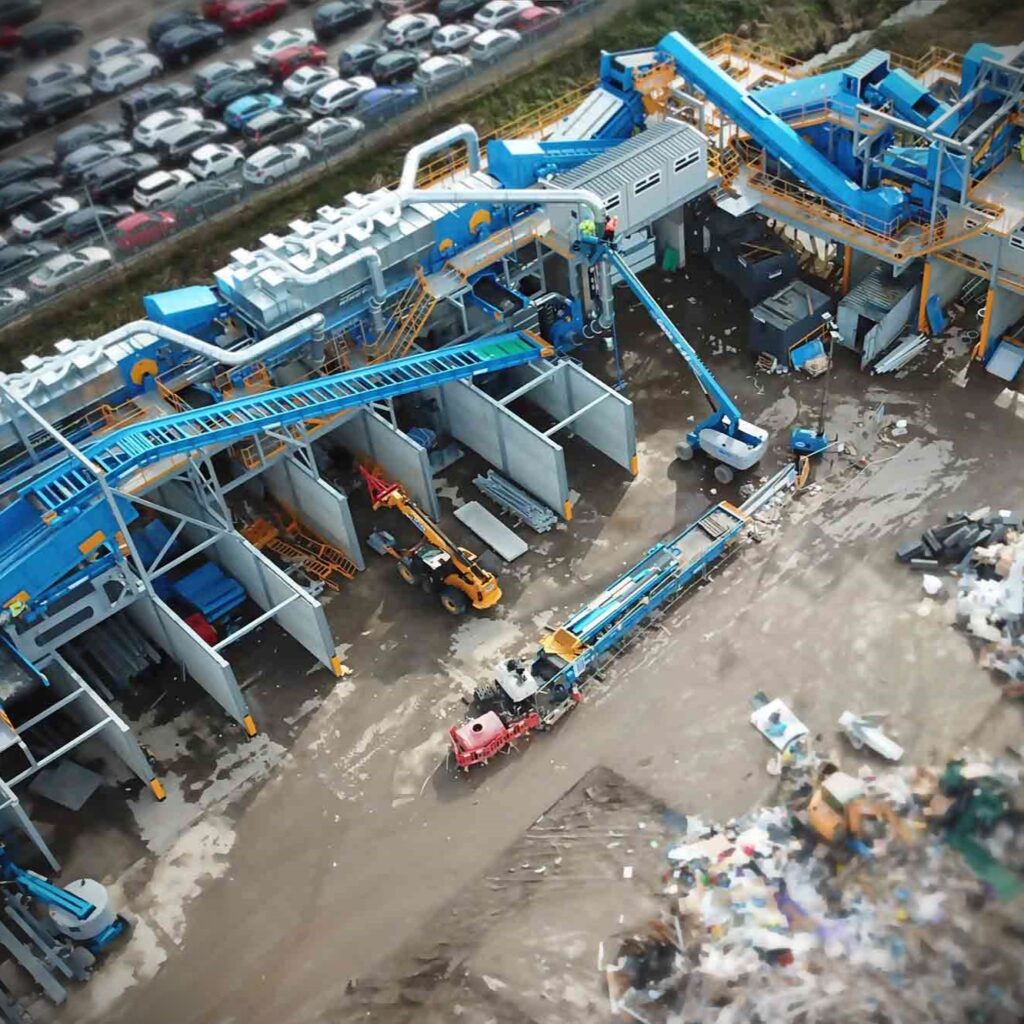

3. Disposal Methods for Non-Recyclables
Waste that cannot be recycled undergoes one of the following treatments:
- Landfills: Although landfill use has declined since 2000 due to high landfill taxes, methane emissions remain a significant issue.
- Energy-from-Waste (EfW): Some waste gets incinerated to generate electricity, reducing landfill reliance. However, new emissions regulations may impact this method’s future viability.
- Composting and Anaerobic Digestion: More councils now process food waste into compost or biogas, supporting renewable energy efforts.
4. Challenges and Areas for Improvement
Despite progress, the UK faces several waste management challenges:
- Recycling Contamination: Placing incorrect materials in recycling bins leads to entire batches being discarded.
- Exporting Waste: Limited UK processing facilities force some recyclables to be sent to countries such as Turkey and Malaysia for processing.
- Public Awareness: Many people remain unsure about what they can and cannot recycle, reducing overall recycling efficiency.
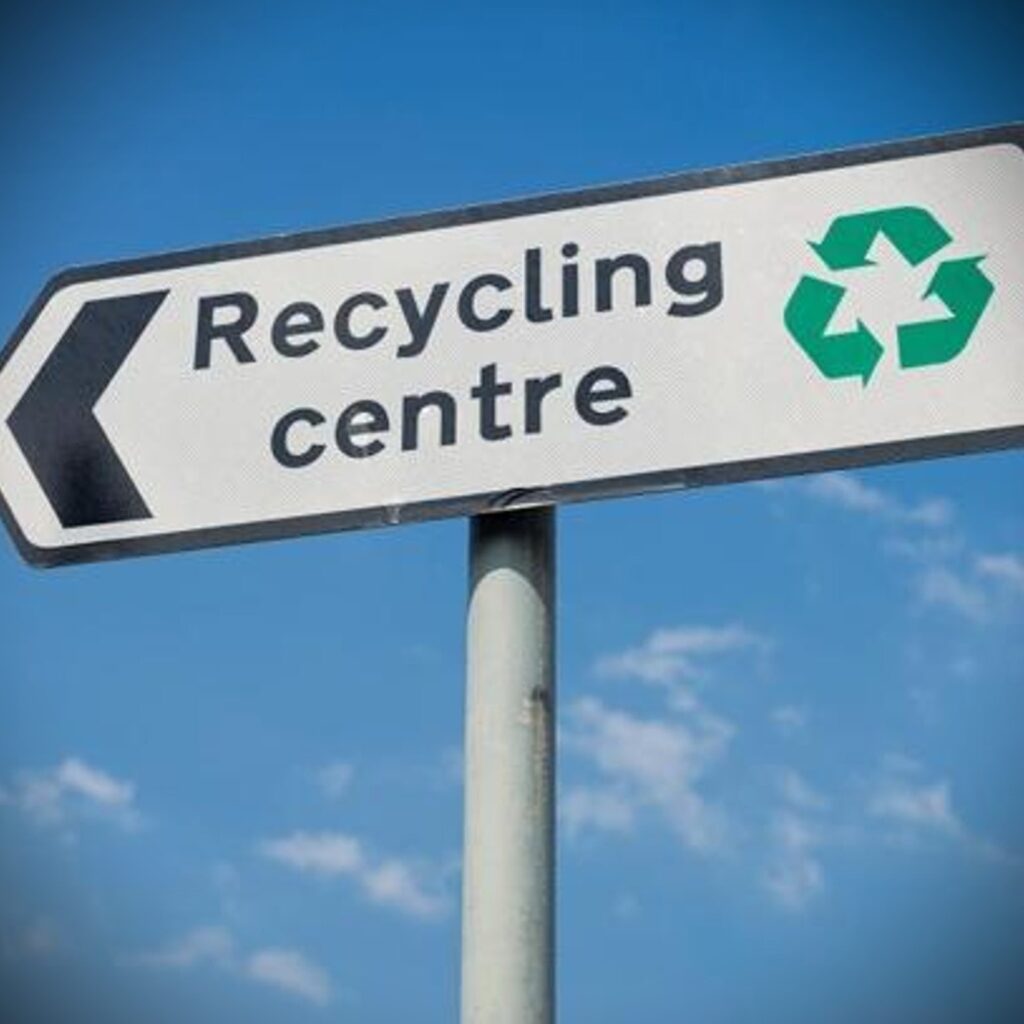
What’s Next?
The UK government is introducing policies to improve waste management. Extended Producer Responsibility (EPR) requires manufacturers to take responsibility for their products’ end-of-life disposal. Meanwhile, Deposit Return Schemes (DRS) aim to encourage consumers to return plastic bottles and cans for recycling. Expanding recycling infrastructure remains a priority to reduce reliance on waste exports and improve domestic processing.
How You Can Help
- Follow local recycling guidelines to prevent contamination.
- Reduce single-use plastics by choosing reusable alternatives.
- Support community-led waste reduction programs and advocate for better recycling policies.
Every small action contributes to a cleaner, greener future. Learn more about how much rubbish is actually recycled and the challenges that remain.
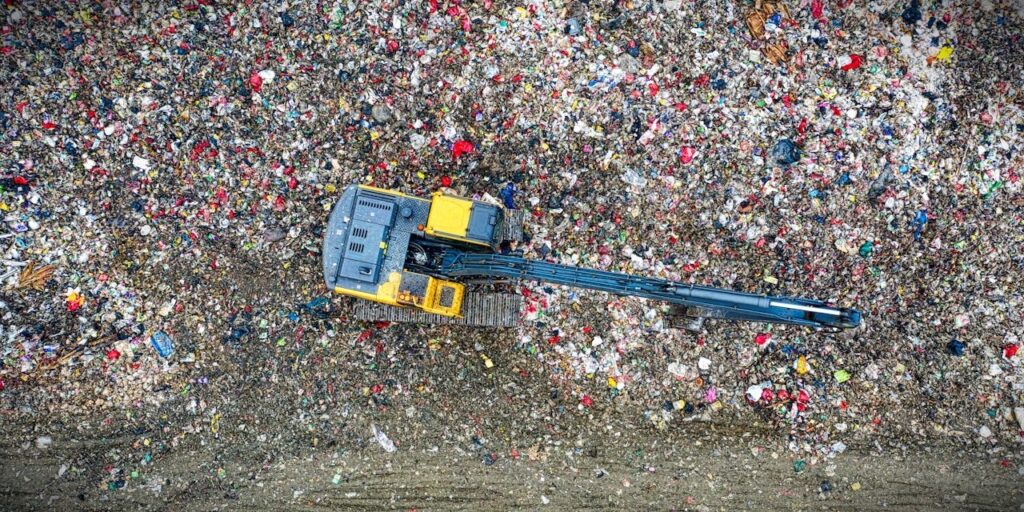
How is Waste Processed After Collection?
Once waste collectors pick up household rubbish, they transport it through a structured process of sorting, recycling, and disposal. This system aims to maximize recycling, minimize landfill use, and recover energy whenever possible to build a more sustainable waste system.
1. Sorting and Processing
After collection, waste arrives at Materials Recovery Facilities (MRFs), where workers and machines sort it for recycling or disposal. This step ensures that recyclable materials reach the proper processing facilities instead of landfills.
- Mechanical Sorting: Conveyor belts, magnets, and air classifiers quickly separate different materials.
- Manual Sorting: Workers remove contaminants to prevent entire batches from being rejected.
- Baling and Distribution: Machines compress processed recyclables into bales before transporting them to UK-based or international reprocessing plants.
2. Recycling and Reuse
Once sorted, recycling facilities transform materials into new products:
- Plastics: Workers sort plastics by type before shredding, washing, melting, and reforming them into reusable pellets.
- Glass: Facilities crush glass into cullet and melt it to manufacture new glass containers.
- Paper & Cardboard: Machines pulp, clean, and reshape them into fresh paper products.
- Metals: Factories melt down separated metals before reforming them for industrial use.
Because the UK lacks enough recycling capacity, companies still export some materials to Turkey, Malaysia, and the Netherlands for processing.
3. Waste-to-Energy (EfW) Processing
For non-recyclable waste, Energy-from-Waste (EfW) plants provide an alternative disposal method. These facilities ensure that waste contributes to energy production instead of filling up landfills.
- Incineration: High-temperature furnaces burn waste to generate electricity.
- Anaerobic Digestion: Controlled environments break down organic waste, producing biogas for fuel.
- Refuse-Derived Fuel (RDF): Plants convert non-recyclable waste into fuel pellets for industrial energy use.
However, the UK Emissions Trading Scheme (ETS) enforces stricter regulations, which may change the future of waste-to-energy practices.
4. Landfill: The Last Resort
Despite advancements in waste processing, some waste still ends up in landfills. This method remains the least desirable option because of its environmental impact.
- Methane Emissions: Organic waste decomposes in landfills and releases methane, a potent greenhouse gas.
- Pollution Risks: Poorly managed landfill sites contaminate soil and water sources.
- Waste Reduction Strategies: The UK has significantly reduced landfill use by increasing taxes, improving recycling policies, and investing in waste-to-energy projects.
5. The Future of Waste Processing
To improve waste management, the UK is investing in several key initiatives:
- Extended Producer Responsibility (EPR): This policy makes manufacturers responsible for managing the waste their products create.
- Deposit Return Schemes (DRS): Consumers receive financial incentives when they return plastic bottles and cans for recycling.
- Investment in Recycling Facilities: Expanding domestic processing capabilities will reduce the UK’s reliance on waste exports.
- Advanced Recycling Technologies: AI-powered sorting systems and chemical recycling innovations will increase efficiency.
How You Can Help
- Recycle correctly by following local guidelines to prevent contamination.
- Reduce plastic waste by choosing reusable alternatives.
- Support community-led waste reduction initiatives and advocate for better policies.
By making informed decisions and adopting sustainable habits, both individuals and businesses can help create a cleaner, more efficient waste system in the UK.
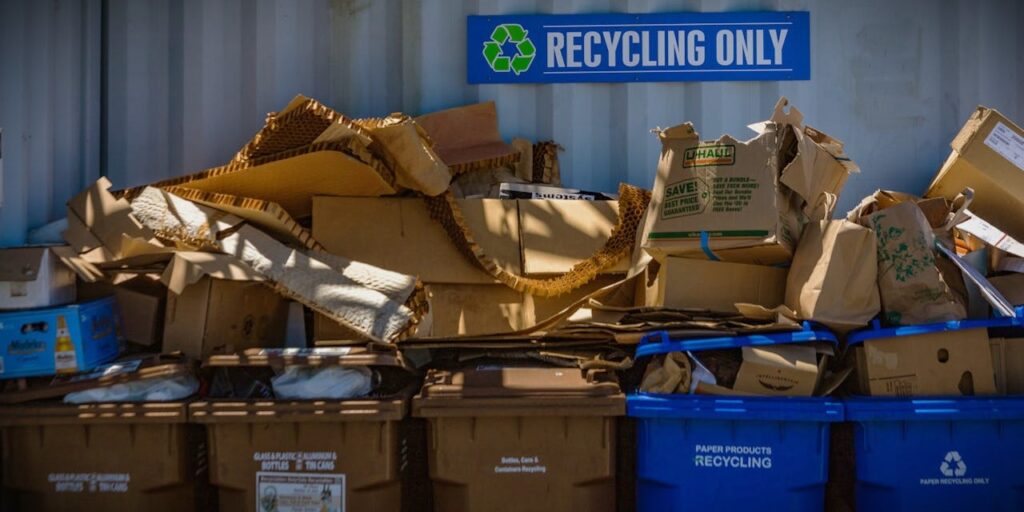
Where Does Recycling Go?
Recycling plays a key role in reducing waste, but what happens after it leaves your bin? Understanding where recycling goes highlights both the challenges and improvements needed in the UK’s waste system.
1. Sorting at Materials Recovery Facilities (MRFs)
After collection, workers transport recyclables to Materials Recovery Facilities (MRFs), where they sort them before processing. This step ensures that materials remain reusable instead of ending up in landfills.
- Mechanical Sorting: Conveyor belts, magnets, and air blowers quickly separate materials by type.
- Manual Sorting: Workers remove contaminants to keep entire batches from being rejected.
- Baling and Transport: After sorting, machines compress materials into bales and ship them for reprocessing.
2. Domestic vs. Exported Recycling
While UK facilities process some recyclables, limited infrastructure forces waste management companies to export a significant portion. This reliance on exports creates both benefits and risks:
- UK-Based Recycling: Factories process glass, metals, and some paper domestically, reducing export dependency.
- Recycling Exports: Companies ship plastics and mixed recyclables to Turkey, Malaysia, and the Netherlands due to the UK’s lack of capacity.
- Environmental Concerns: Improper handling of exported waste leads to illegal dumping and pollution in receiving countries.
3. Processing and Repurposing
Once sorted, facilities process recyclables into new products:
- Plastics: Workers separate plastics by type before shredding, washing, melting, and reforming them into pellets for manufacturing.
- Glass: Machines crush glass into cullet and melt it to create new containers.
- Paper & Cardboard: Processing plants pulp, clean, and reshape them into fresh paper products.
- Metals: Factories separate, melt, and reform metals for industrial use.
4. Challenges in the Recycling System
Despite progress, the UK faces several recycling challenges:
- Contamination Issues: Incorrect sorting results in rejected loads, reducing efficiency.
- Downcycling: Some materials, especially plastics, lose quality after multiple recycling cycles.
- Market Demand: Recycled materials need buyers, or companies risk stockpiling or discarding them.
- Limited Processing Capacity: Expanding UK recycling plants can help reduce dependence on exports.
5. The Future of Recycling in the UK
To improve recycling, the UK is adopting several key initiatives:
- Extended Producer Responsibility (EPR): This policy makes manufacturers responsible for managing waste from their products.
- Deposit Return Schemes (DRS): These programs reward consumers for returning plastic bottles and cans for recycling.
- Investment in Recycling Infrastructure: Companies are building more UK-based facilities to process recyclables locally.
- Innovative Recycling Technologies: Advances like chemical recycling allow facilities to recover more materials and reduce waste.
How You Can Help
- Recycle correctly by following local guidelines and avoiding contamination.
- Reduce waste by choosing reusable products over disposables.
- Support sustainable brands that use recycled materials in their products.
- Advocate for stronger recycling policies to improve waste management systems.
By understanding where recycling goes and the challenges involved, individuals can make informed choices that support a more sustainable UK waste system.
Why Does the UK Export Waste?
The UK generates millions of tonnes of waste each year. However, limited domestic recycling capacity forces businesses and local councils to export large portions of it. While sending waste abroad allows materials to be recycled, concerns remain about its environmental impact and ethical disposal.
1. Why Does the UK Send Waste Abroad?
Several factors drive the UK’s reliance on waste exports:
- Limited Recycling Infrastructure: The UK lacks enough domestic recycling plants to process all its waste efficiently.
- Economic Incentives: Exporting waste costs less than processing it locally.
- Global Demand for Recycled Materials: Countries with strong manufacturing industries rely on imported waste as raw materials.
- High Landfill Taxes: Expensive landfill fees encourage businesses to send waste abroad instead of disposing of it locally.
2. Where Does the UK Export Its Waste?
The UK ships waste to multiple countries, each playing a different role in processing and recycling:
- Turkey: The largest importer of UK plastic waste, though concerns about illegal dumping persist.
- Malaysia: A key destination for mixed recyclables, but stricter regulations now limit waste imports.
- Netherlands: A major hub for processing and recycling waste efficiently within Europe.
- Germany & Poland: These countries process recycled metals, paper, and plastics for industrial reuse.
3. What Types of Waste Does the UK Export?
The UK sends various waste materials overseas, including:
- Plastic Waste: Limited UK recycling facilities force businesses to ship large quantities abroad.
- Paper & Cardboard: Countries with high demand for recycled paper products receive these exports.
- Mixed Recycling: Complex materials that require specialized separation often go to overseas facilities.
- Electronic Waste (E-Waste): While some e-waste gets properly processed, a portion ends up in illegal dumping sites.
4. Environmental and Ethical Concerns
Although exporting waste helps the UK reduce landfill use, it also creates serious challenges:
- Illegal Dumping: Some receiving countries do not properly process exported waste, leading to pollution.
- High Carbon Footprint: Transporting waste long distances increases greenhouse gas emissions.
- Health Risks: Poor waste management in recipient countries exposes local communities to hazardous materials.
- Lack of Transparency: Weak tracking systems enable unethical disposal practices to go unnoticed.
5. How is the UK Reducing Waste Exports?
To address these issues, the UK is implementing several initiatives:
- Banning Plastic Waste Exports to Non-OECD Countries: This prevents illegal dumping and environmental harm.
- Expanding Domestic Recycling Infrastructure: More UK-based facilities will reduce reliance on exports.
- Extended Producer Responsibility (EPR): This policy makes manufacturers responsible for managing the waste their products create.
- Strengthening Waste Export Regulations: New tracking systems ensure responsible waste management and disposal.
How You Can Help
- Reduce Plastic Waste: Choose reusable products to minimize waste.
- Recycle Properly: Follow local guidelines to prevent contamination.
- Support UK Recycling Initiatives: Advocate for investment in better waste processing and stricter waste management policies.
By understanding why the UK exports waste and its impact, individuals can make informed choices that contribute to a more sustainable and responsible waste system.
How Much Rubbish is Actually Recycled?
Recycling plays a crucial role in reducing waste and conserving resources, but how much of the UK’s rubbish is actually recycled? Despite ongoing efforts, contamination, limited infrastructure, and fluctuating market demand continue to impact recycling rates.
1. UK Recycling Rates: Where Do We Stand?
- In 2022, 44% of household waste in the UK was recycled, a slight decline from 44.6% in 2021.
- The UK still lags behind countries like Germany, which boasts a 68% recycling rate.
- Regional Differences: Wales leads with a 56.9% recycling rate, while England follows at 43.4%, and Scotland at 42.1%.
2. What Gets Recycled?
Recycling rates vary by material, with some items being processed more efficiently than others:
- Paper & Cardboard: 73.4% was recycled in 2023, making it one of the most efficiently processed materials.
- Glass: 67.8% of glass waste was successfully recycled in 2023.
- Metals (Aluminium & Steel): 71.2% of metal waste was recycled in 2023.
- Plastics: Plastic packaging had a 44.2% recycling rate in 2021, but overall plastic recycling remains low due to material limitations.
- Food Waste: Despite composting initiatives, only 18% of food waste is recycled effectively.
3. Why Isn’t More Rubbish Recycled?
Several factors contribute to low recycling rates in the UK:
- Contamination: When non-recyclables are mixed with recyclables, entire batches can be rejected.
- Confusing Recycling Rules: Guidelines vary between councils, making correct waste sorting difficult.
- Limited Recycling Infrastructure: The UK still exports a large portion of its recyclables due to insufficient domestic processing capacity.
- Single-Use Plastics: Many plastic products cannot be recycled because they are made from mixed materials that are difficult to separate.
4. Where Does UK Recycling Go?
- Some recyclables are processed domestically, but a significant portion is exported to Turkey, Malaysia, and the Netherlands.
- In 2023, the UK exported 568,000 metric tons of plastic waste, with Turkey alone receiving 140,000 metric tons.
- Unfortunately, some exported waste is mishandled, leading to illegal dumping and environmental damage.
- Learn more about where UK waste goes and how waste exports affect recycling efforts.
5. What’s Changing? How the UK is Improving Recycling
To increase recycling rates, the UK is introducing several major initiatives:
- Extended Producer Responsibility (EPR): This policy shifts the responsibility of waste management to manufacturers, encouraging sustainable product design.
- Deposit Return Schemes (DRS): Consumers will be incentivized to return plastic bottles and cans for a refund.
- Standardized Recycling Rules: The government aims to implement uniform recycling guidelines across all UK councils to reduce confusion and contamination.
- Investment in Recycling Infrastructure: Expanding UK-based processing facilities will help reduce reliance on exports and improve efficiency.
6. How You Can Make a Difference
- Follow local recycling guidelines carefully to avoid contamination.
- Reduce plastic waste by choosing reusable alternatives instead of disposables.
- Support a circular economy by purchasing recycled products whenever possible.
- Compost food waste to divert organic materials from landfills and reduce methane emissions.
By understanding how much rubbish is actually recycled and actively participating in waste reduction efforts, the UK can move toward a more efficient and sustainable waste management system.What Happens to Landfill Waste?
What Happens to Landfill Waste?
Despite improvements in recycling, millions of tonnes of waste still end up in UK landfills each year. While landfill use has declined, it remains the last resort for non-recyclable waste, raising concerns about its environmental impact and long-term sustainability.
1. What Goes to Landfill?
Although the UK has reduced landfill dependency, certain types of waste still require disposal:
- Non-recyclable plastics and mixed-material packaging that cannot be processed.
- Food waste that isn’t composted or sent for anaerobic digestion.
- Construction and demolition debris that cannot be reused or repurposed.
- Hazardous waste that requires strict containment and disposal procedures.
2. How Do Landfills Work?
To minimize environmental harm, landfills follow strict regulations. The process includes:
- Waste Deposition: Rubbish is placed into designated landfill cells to manage waste effectively.
- Compaction: Heavy machinery compresses waste, reducing its volume.
- Covering: Layers of soil or alternative materials seal the waste, preventing exposure and reducing odours.
- Leachate Collection: Rainwater filtering through waste creates a toxic liquid. Modern landfill systems capture and treat it to prevent contamination.
- Gas Extraction: As waste decomposes, it releases methane, a powerful greenhouse gas. Many modern landfills capture methane and convert it into energy.
3. Environmental Impact of Landfills
Although landfills provide waste disposal solutions, they also create serious environmental concerns:
- Methane Emissions: Landfills are among the largest human-made sources of methane, a gas 25 times more potent than CO₂ in trapping heat.
- Soil & Water Contamination: If not managed properly, landfill sites can leak pollutants into surrounding ecosystems, harming wildlife and water sources.
- Loss of Land Space: Landfills require vast amounts of land, and once full, they remain unusable for years.
4. Alternatives to Landfill Waste
To reduce landfill waste, the UK is focusing on alternative disposal methods:
- Energy-from-Waste (EfW): Incineration converts waste into electricity. Although this reduces landfill reliance, concerns over emissions remain.
- Anaerobic Digestion: Organic waste decomposes in oxygen-free environments, producing biogas for renewable energy and nutrient-rich digestate for farming.
- Recycling Innovations: Advanced sorting technology and chemical recycling improve material recovery and reduce landfill waste.
- Stronger Waste Reduction Policies: Higher landfill taxes and bans on biodegradable waste encourage businesses and households to adopt greener solutions.
5. The Future of Landfill Waste in the UK
The UK is working towards phasing out landfill use by:
- Expanding composting and anaerobic digestion facilities to process organic waste more efficiently.
- Investing in cutting-edge recycling technologies to maximize material recovery.
- Encouraging businesses and individuals to embrace zero-waste lifestyles by reducing, reusing, and recycling more effectively.
- Turning non-recyclable waste into sustainable fuel for industrial and commercial energy needs.
How You Can Help Reduce Landfill Waste
- Recycle correctly by following local guidelines to avoid contamination.
- Compost food waste to prevent organic materials from entering landfills.
- Choose sustainable products with minimal or recyclable packaging.
- Support businesses that prioritize waste reduction and sustainable practices.
By reducing landfill waste and adopting sustainable waste management practices, the UK can move toward a cleaner, more environmentally responsible future.
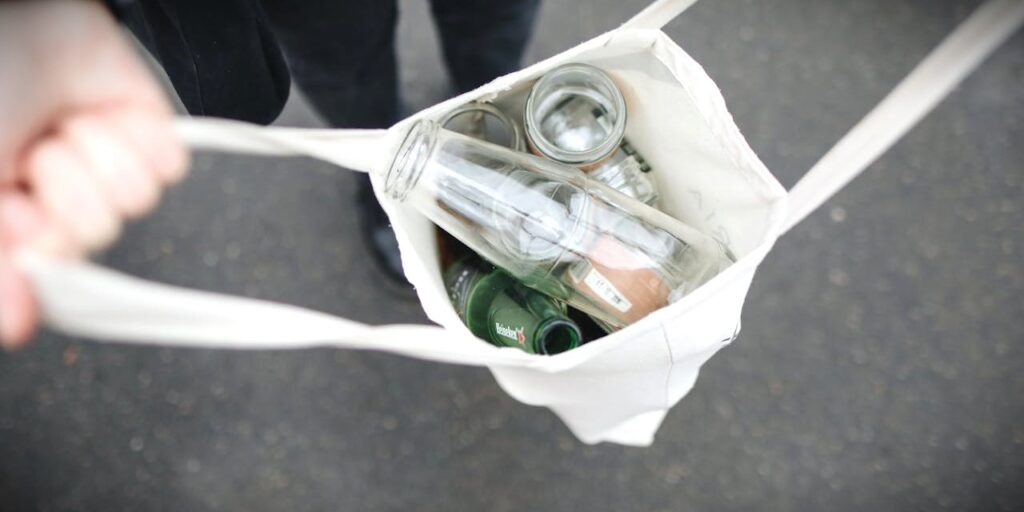
How Can Individuals Reduce Their Waste?
Reducing waste at an individual level is one of the most effective ways to support sustainable waste management. Small lifestyle changes can cut landfill waste, improve recycling efficiency, and contribute to a circular economy. Reducing waste at home plays a crucial role in sustainable waste management. If you’re looking for practical steps to minimize your waste, check out our guide on How to Begin Your Zero Waste Journey: Easy Tips.
1. Cut Down on Single-Use Plastics
- Carry reusable bags, bottles, and coffee cups instead of relying on disposables.
- Choose plastic-free or minimal packaging when shopping for groceries and household items.
- Swap single-use cutlery, straws, and plates for compostable or reusable alternatives.
2. Improve Recycling Habits
- Follow local recycling guidelines to prevent contamination.
- Rinse recyclables before placing them in the bin to ensure they can be processed properly.
- Use designated drop-off points for hard-to-recycle items like batteries, electronics, and textiles.
3. Compost Food and Garden Waste
- Set up a home composting system to turn food scraps and garden waste into nutrient-rich soil.
- Take advantage of local food waste collection services if available in your area.
- Reduce food waste through meal planning and creative use of leftovers.
4. Choose Sustainable and Reusable Products
- Invest in high-quality, durable products instead of disposable alternatives.
- Repair or upcycle clothing, furniture, and appliances rather than replacing them.
- Support brands that prioritize recycled or ethically sourced materials.
5. Reduce Household Waste
- Buy in bulk to cut down on excessive packaging.
- Opt for refillable and concentrated products to reduce plastic use.
- Switch to digital receipts and documents to minimize paper waste.
6. Support a Circular Economy
- Donate or sell unwanted items instead of discarding them.
- Purchase second-hand clothing, furniture, and electronics to extend their lifespan.
- Get involved in community waste reduction programs or local swap events.
7. Advocate for Better Waste Management
- Support policies that promote recycling infrastructure and sustainability.
- Encourage businesses to minimize packaging waste and improve product recyclability.
- Spread awareness about waste reduction and sustainable living within your community.
Small Changes, Big Impact
By making mindful choices, individuals can significantly reduce waste and contribute to a cleaner, more sustainable future. Whether through recycling, thoughtful purchasing, or composting, every action plays a role in building a greener UK.
Conclusion
The UK continues to make significant progress in sustainable waste management, yet challenges persist. By expanding recycling infrastructure, reducing landfill dependency, and embracing a circular economy, the country moves closer to a waste-free future. However, success depends on continuous efforts from governments, businesses, and individuals.
Key Takeaways
- Recycling and waste reduction efforts are improving, but increased investment is essential to boost domestic processing capacity.
- Government policies, such as Extended Producer Responsibility (EPR), Deposit Return Schemes (DRS), and landfill tax increases, are driving sustainable waste management forward.
- Technological advancements in chemical recycling, AI-powered sorting, and waste-to-energy solutions are enhancing efficiency and reducing waste.
- Consumer choices are crucial—individuals can help by reducing waste, improving recycling habits, and supporting sustainable brands.
Looking Ahead
For the UK to achieve a truly circular economy, it must focus on:
- Expanding domestic recycling facilities to process more waste locally and reduce reliance on exports.
- Developing advanced waste processing solutions to handle complex materials efficiently and improve recovery rates.
- Encouraging businesses and individuals to adopt waste reduction strategies and shift toward sustainable alternatives.
How You Can Make a Difference
- Recycle correctly by following local guidelines and preventing contamination.
- Use reusable products to cut down on single-use plastics.
- Support sustainable brands that prioritize eco-friendly materials and packaging.
- Advocate for stronger waste management policies to drive lasting change in your community.
By working together—through policy reform, technological innovation, and everyday sustainable actions—the UK can transition toward a more responsible, waste-free future.

